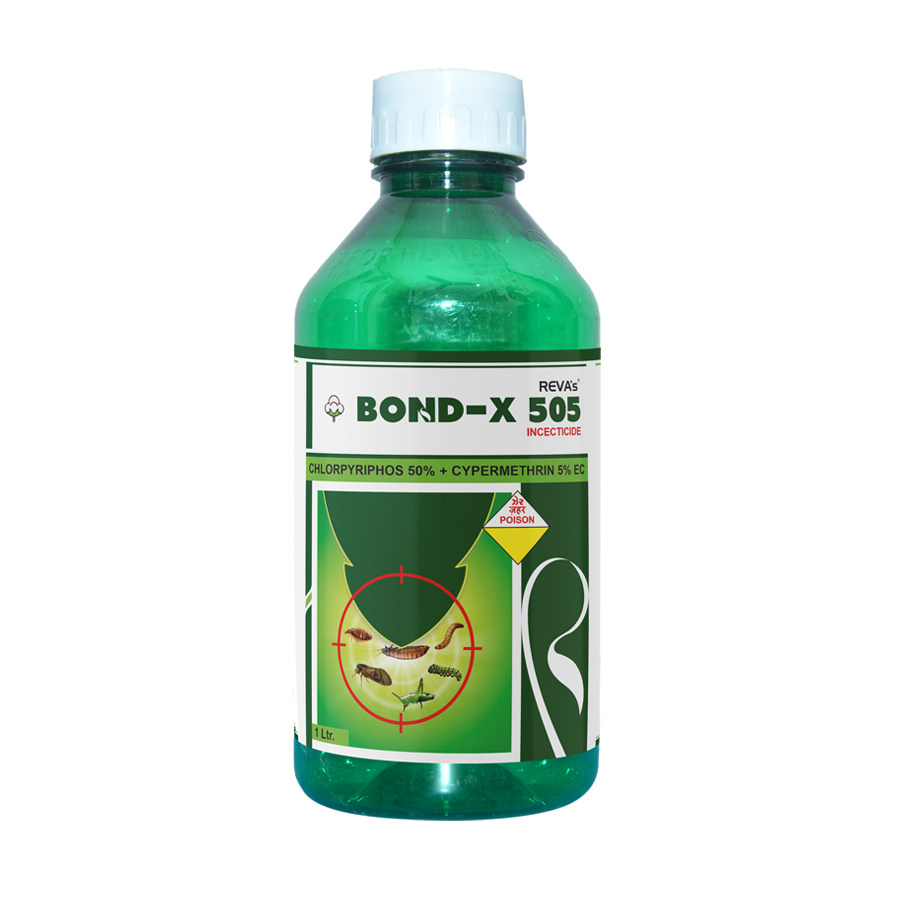Bond-X 505
Bond-X 505
Chlorpyriphos 50% + Cypermethrin 5% EC

It is emulsifiable concentration containing active ingredient Chlorpyriphos 50% w/w cypermethrin 5% w/w balance emulsifiers and solvent. It effectively controls pest complex on cotton. *Caution : Toxic to aquatic organisms hence should not be used near water bodies, aquaculture or pisciculture. It is toxic to honeybees, spray application should be avoided during foraging period of bees. Product is highly toxic to birds hence avoid use near bird habitat.
Recommendation
| Crop(s) | Common Name of Pest | Dosage/HA | Dilution in Water liter | Waiting Period between last spray to harvest days | Re-entry after each Applicatio n (In Hours) | |
| AI gm | Formulation liter | |||||
| Cotton | Aphid,Thrips,Jassid , Whitefly,American bollworm ,Pink bollworm ,Spotted bollworm,Spotted litura | 500 + 50 | 1.000 | 500-1000 | 15 | |
| Rice | Stem borer, leaf folder | 312 + 32 to 375 + 38 | 0.625-0.750 | 500-700 | 15 | |
Direction Of Use
Depending upon the stage of the crop increase or decrease the quantity of water. Plant Protection Equipment: Knapsack sprayer, foot sprayer, compression knapsack sprayer, compression knapsack battery sprayer, and ASPEE-HTP power sprayer fitted with hollow cone nozzle.
Time of Application
-
Precautions
- Keep away from foodstuffs, empty foodstuff containers and animals food.
- Avoid contact with mouth, eyes and skin.
- Avoid inhalation the spray mist. Spray in the direction of wind.
- Wash thoroughly the contaminated clothes and parts of the body after spraying.
- Do not smoke, drink, eat and chew anything while spraying.
- Wear full protective clothing while mixing and spraying.
Symptoms Of Poisoning
Headache, giddiness, vertigo,nausea, vomiting, blurred vision, diarrhoea, convulsions, sweating,excessive lacrimation, and salivation may occur.
First Aid
- If swallowed, induce vomiting by tickling the back of throat. Repeat it until the vomitus is clear. Do not induce vomiting if the patient is unconscious.
- If clothing and skin are contaminated, remove the clothes and wash the contaminated skin with copious amount of soap and water.
- If eyes are contaiminated, flush with plenty of saline/clean water for about 10 to 15 minutes.
- If inhaled, remove the patient to fresh air
Phytotoxicity
-
Antidote
- Atropinize the patient immediately and maintain full atropinization by repeated doses of 2 to 4 mg. of atropine sulphate intravenously at 5 to 10 minutes interval. As much as 25 to 50 mg. of atropine may be required in a day. The need for further atropine administration is guided by the continuance of symptoms. Extent of salivation is a useful criterion for dose adjustment.
- Dissolve 1-2 gm of 2 PAM in 10 ml distilled water and inject intravenously very slowly for 10-15 minutes.
- Antihistamines may be given for allergic manifestation.
Disposal Of Used Container
- It shall be the duty of manufactures, formulators of insecticide and operators to dispose packages or surplus materials and washings from the machines in a safe manner, so as to prevent environmental or water pollution.
- The used packages shall not be left outside to prevent their re-use.
- Packages shall be broken and burried away from habitation.
Storage Conditions
- The packages containing the insecticide shall be stored in separate rooms or premises away from the rooms or premises used for storing other articles particularly articles or shall be kept in seperate almirahs under lock and key depending upon the quantity and nature of the insecticide
- The rooms or premises meant for storing the insecticide shall be well built, dry, well-lit and ventilated and of sufficient dimensions.
